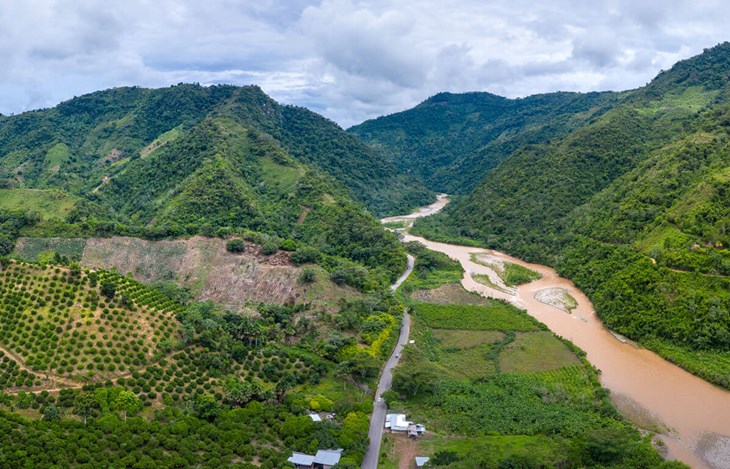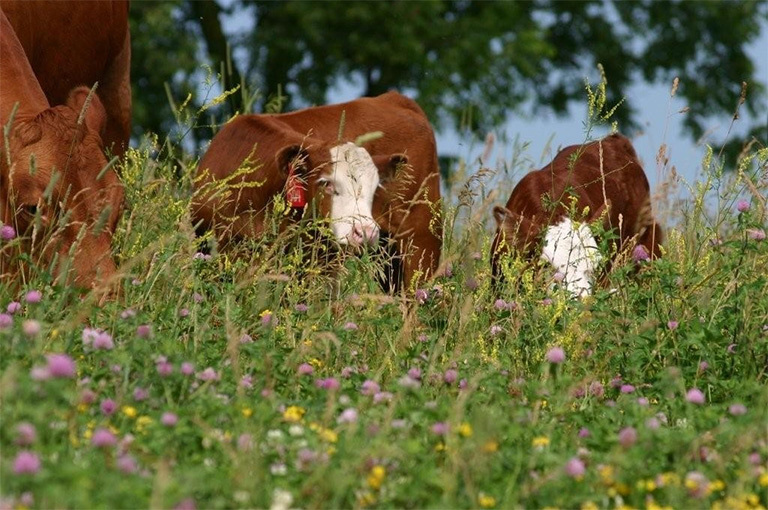Published 2/3/2021

Today, (3rd February), a new Chatham House report, ‘Food System Impacts on Biodiversity Loss’ was launched in partnership with The United Nations Environment Programme (UNEP) and Compassion in World Farming during a live webinar, available to view below.
The event featured several high-profile speakers, including Susan Gardner, Director of the Ecosystems Division with UNEP; Professor Tim Benton, Research Director – Emerging Risks, Chatham House; our Global CEO, Philip Lymbery; and Jane Goodall PhD, DBE, Founder – the Jane Goodall Institute & UN Messenger of Peace.
Three vital steps
This report presents the steps needed to ensure the preservation of our biodiversity on a global scale, raise awareness of our environment’s dire circumstances and increase the possibility of implementation. It focuses on three actions that can combat the looming threats of biodiversity loss and climate change:
- Global dietary patterns need to move towards more plant-heavy diets. This shift, along with the reduction of global food waste, would reduce demand and the pressure on the environment and land.
- More land needs to be protected and set aside for nature. The greatest gains for biodiversity will occur when we preserve or restore whole ecosystems. Therefore, we need to avoid converting land for agriculture. Human dietary shifts are essential to preserve existing native ecosystems and restore those that have been removed or degraded.
- We need to farm in a more nature-friendly, biodiversity-supporting way, limiting the use of inputs and replacing monoculture with polyculture farming practices. Dietary change is necessary to enable land to be returned to nature, and to allow widespread adoption of nature-friendly farming without increasing the pressure to convert natural land to agriculture.
A new relationship with the natural world
Susan Gardner, Director of Ecosystems Division at UNEP, began the event by stressing the need to re-evaluate our current food system, which is current “aimed at producing more food, quickly and cheaply, without taken into account the hidden costs to biodiversity…”
Gardner also spoke about the potential to effect change on a personal level:
"We can vote with our forks. We can be empowered to decide what kind of food system we want to support.”
Professor Tim Benton, Research Director for Chatham House, agreed that a shift in perspective is vital to addressing this crisis:
“We’ve got to get out of this mindset that we’ve got to grow more food. It’s about growing the right sorts of food – about taking pressure off the need to grow more [food] in an intensive way.”
Philip Lymbery, who spoke next, emphasised the importance of reducing our reliance on intensive farming, and detailed the devastating environmental impacts of industrial animal agriculture.
“Our diets have become out of balance, over-dependent on meat and dairy, putting ecosystems under ever greater pressure,” he said. “In this age of pandemic, climate and biodiversity emergency, there is an urgent need to end factory farming and reduce the consumption of meat and dairy.”
In addition to explaining how a reduction in the consumption of animal products will limit the biodiversity loss and environmental degradation witnessed worldwide, Philip also highlighted the benefits of regenerative farming methods. He ended his speech by calling for a mass movement to end intensive animal farming:
“…we need to seize the opportunity of this year’s UN Food Systems Summit to move toward a global agreement to end factory farming. To reset our food system. To regenerative, restorative ways of producing food. Farming with nature, not against her. For all our sakes.”
The final speaker, Jane Goodall, PhD, DBE, Founder – the Jane Goodall Institute & UN Messenger of Peace, emphasised the true impacts of biodiversity loss and made a plea for people think locally as well as globally:
“People must understand that we cannot disassociate ourselves from the natural world. We’re part of it and we depend on it, for clean air and water and everything else. So, we have to develop a new relationship with the natural world.”
She stressed that, “it’s very clear that we’re facing an absolute crisis. We’re reaching a point of no return if we don’t take action today.”
Hitting the headlines
The report gained excellent coverage across the globe, including in Italy, Turkey, Sweden and the Netherlands.
Here in the UK, the report was covered in major national outlets, including The Independent, The Guardian and the Daily Mail.
Read the ‘Food System Impacts on Biodiversity Loss’ report, and watch the webinar below:
